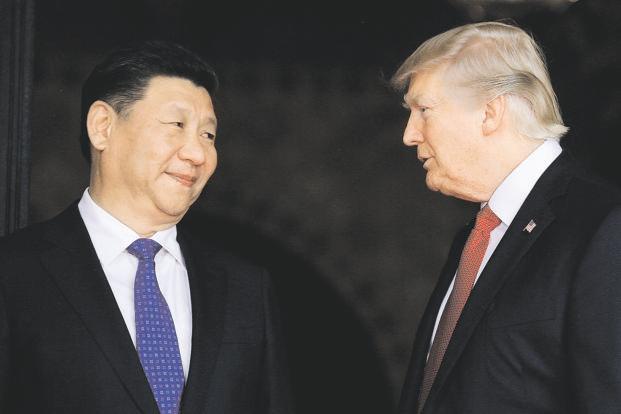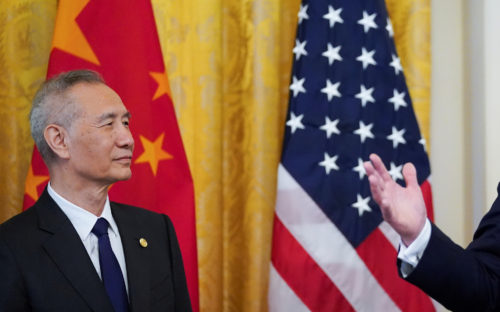Trade war, day 117: U.S. Commerce Department bans technology export to Fujian Jinhua


Yesterday on Access (paywall), we noted how more and more companies with supply chains in China say they are preparing to move production out of the country.
- This is music to Trump administration officials’ ears, as it has become increasingly clear a major goal of theirs is to “decouple” the American economy from China and reduce technology supply chain risk.
- They may be less happy to know that only a tiny fraction of companies are considering relocating production to the U.S. — Southeast Asia, and Vietnam in particular (Foreign Policy porous paywall), is a top choice a for non-China manufacturing base.
The supply chain struggle was taken up a notch by the U.S. Commerce Department today. According to a press release on its website:
Effective October 30, 2018, the Department of Commerce has taken action to restrict exports to Fujian Jinhua Integrated Circuit Company, Ltd. (Jinhua) by adding them to the Entity List (Supplement No. 4 to Part 744 of the Export Administration Regulations (EAR)), because Jinhua poses a significant risk of becoming involved in activities that are contrary to the national security interests of the United States.
Fujian Jinhua was a central character in a dramatic tale of technology theft told by the New York Times in June (porous paywall). According to the story, the Boise, Idaho-based Micron Technology had a joint venture with the Taiwanese company UMC, which then turned messy when UMC and Fujian Jinhua lured away engineers and allegedly stole technology for a new chipmaking plant in southeastern China. Multiple related lawsuits remain under litigation.
The Wall Street Journal notes (paywall) that Jinhua is “one among a trio of state-backed Chinese semiconductor companies that Beijing is girding to ramp up production for the memory market, including Tsinghua Unigroup Ltd. and Innotron Memory Co,” and says this about the impact of the Commerce Department ban:
The Commerce Department ban will hurt Jinhua because the company likely relies on a handful of California-based companies that dominate the global supply of microtechnology that stacks, connects, cleans and measures the wafers that go into making chips.
Meanwhile, in the “trade” part of the trade war, the Trump administration is still preparing to impose tariffs on all Chinese imports. Bloomberg reports (porous paywall):
The U.S. is preparing to announce by early December tariffs on all remaining Chinese imports if talks next month between presidents Donald Trump and Xi Jinping fail to ease the trade war, three people familiar with the matter said.
Two caveats:
- There would be a 60-day comment period, Bloomberg says, putting the implementation date around early February. (Bloomberg notes the inauspicious timing: China will celebrate the Lunar New Year and welcome the Year of the Pig on February 5, 2019.)
- “I think we’ll make a great deal with China, and it has to be great,” Trump told Fox News today, SCMP reports, though as always he did not specify a timeline.
Other trade war-related news:
- Market reaction
US stocks take dive on report of China tariff escalation / Asia Times
Economists cut China GDP estimates as trade war trumps stimulus / Bloomberg (porous paywall) - Analysis
American tech firms are winning the R&D spending race with China / WSJ (paywall)
“Led by Amazon and Google, U.S. firms spend $5 for every $1 by Chinese companies, PwC says.”
Why China technology-transfer threats matter / U.S. Department of State
A speech by Christopher Ashley Ford, Assistant Secretary, Bureau of International Security and Nonproliferation. - Currency concerns
Where will the yuan go next? China’s big choice / Council on Foreign Relations
Yuan’s slide to decade low puts China in tricky position / Nikkei Asian Review
“The People’s Bank of China on Tuesday set the yuan midpoint at 6.9574 to the dollar, 0.28% lower than the previous day and the lowest level since May 2008.” - Tourism
China has a big weapon that it hasn’t used in the trade war — yet. Tourists. / Washington Post
“Fewer Chinese business executives, tourists and students are visiting the United States, a sign that the trade war between Washington and Beijing might spread in unpredictable and costly ways.” - Fentanyl worries
US lawmakers propose going after Chinese suppliers of fentanyl / SCMP
“If passed, the Combating Illicit Fentanyl Act of 2018 would commit the US Treasury and State Departments to carry out investigations to identify any Chinese national involved in the production and trafficking of fentanyl.” - Soybeans
Ship with US soybeans changes course from China to Vietnam / Bloomberg (porous paywall)
Previously in The China Project’s trade war coverage:
Trade war, day 112: U.S. refuses to negotiate before China shows its hand






